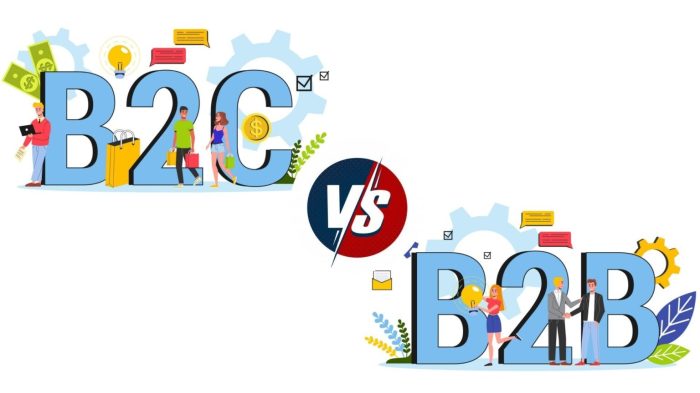Understanding B2B and B2C Sales sets the stage for a deep dive into the world of commerce, where differences in sales tactics and strategies unfold with captivating allure. Get ready to explore the dynamic landscape of business-to-business and business-to-consumer transactions like never before.
Get ready to uncover the nuances that define successful sales approaches in both B2B and B2C scenarios.
Differences between B2B and B2C Sales: Understanding B2B And B2C Sales
In the world of sales, there are two main categories: Business-to-Business (B2B) and Business-to-Consumer (B2C). While both involve selling products or services, they cater to different audiences and have distinct strategies.
Examples of B2B Sales Transactions, Understanding B2B and B2C Sales
In B2B sales, companies sell products or services to other businesses. For example, a software company selling its products to a marketing agency for their use in managing client campaigns is a B2B transaction. Another example is a wholesale supplier selling office supplies to a corporate office for their employees’ use.
How the Target Audience Differs between B2B and B2C Sales
The target audience in B2B sales is typically other businesses, which means the focus is on meeting the needs and requirements of companies rather than individual consumers. In contrast, B2C sales target individual consumers who make purchasing decisions based on personal preferences and needs.
Impact of Relationship Building in B2B Sales compared to B2C
Relationship building is crucial in B2B sales as it often involves long-term partnerships and repeat business. Companies value trust, reliability, and quality service when dealing with other businesses. In B2C sales, while relationships can still be important, the focus is more on transactional interactions and appealing to individual consumer preferences.
Strategies for B2B Sales
In the world of B2B sales, personalized communication plays a crucial role in building strong relationships with clients. It involves understanding the specific needs and preferences of each business customer and tailoring your approach accordingly.
Importance of Personalized Communication
- Personalized communication helps in establishing trust and credibility with B2B clients.
- It allows you to address the unique challenges and goals of each business, showing that you value their individual needs.
- By personalizing your interactions, you can better position your products or services as solutions that directly benefit the client.
Sales Cycle Length in B2B versus B2C
- In B2B sales, the sales cycle tends to be longer compared to B2C sales due to the complexity of decision-making processes.
- B2B transactions often involve multiple stakeholders and require thorough evaluation before a purchase decision is made.
- Building relationships and nurturing leads over time are essential components of the B2B sales cycle.
Influence of Procurement Processes and Decision-Making Units
- Procurement processes in B2B sales can be extensive and involve various steps such as requests for proposals, negotiations, and contract finalization.
- Understanding the decision-making units within a B2B client’s organization is crucial for effectively navigating the sales process.
- Factors like budget approval, departmental needs, and overall business objectives can impact the final purchasing decision in B2B sales.
Approaches to B2C Sales

In business-to-consumer (B2C) sales, companies engage with individual consumers to sell products or services. This direct interaction requires a different approach compared to B2B sales. Let’s dive into some key aspects of B2C sales strategies.
Role of Emotions in B2C Sales
Emotions play a significant role in B2C sales as consumers often make buying decisions based on how they feel about a product or brand. Creating emotional connections through marketing campaigns and branding can influence consumer behavior and drive sales. Companies use storytelling, music, visuals, and other emotional triggers to appeal to consumers’ emotions and build brand loyalty.
Significance of Brand Loyalty in B2C Transactions
Brand loyalty is crucial in B2C transactions as it leads to repeat purchases, customer retention, and positive word-of-mouth marketing. Consumers who are loyal to a brand are more likely to choose that brand over competitors, even if the price is higher. Building strong relationships with customers, delivering exceptional customer service, and maintaining consistent quality are essential in fostering brand loyalty.
Impact of Impulse Buying Behavior on B2C Sales Strategies
Impulse buying behavior, where consumers make unplanned purchases based on emotions or sudden desires, can significantly impact B2C sales strategies. Companies leverage this behavior by creating urgency through limited-time offers, flash sales, and persuasive marketing techniques. Understanding what triggers impulse buying and strategically positioning products can lead to increased sales and revenue in B2C markets.
Marketing Techniques for B2B and B2C

When it comes to marketing techniques, both B2B and B2C businesses employ different strategies to reach their target audiences effectively. Let’s delve into some key differences in marketing approaches for these two types of sales.
Content Marketing for B2B Audiences
Content marketing plays a crucial role in B2B sales by providing valuable information and building trust with potential clients. Examples of content marketing tailored for B2B audiences include:
- Whitepapers and case studies showcasing industry expertise
- Webinars and online workshops addressing specific business challenges
- Infographics and data-driven reports to demonstrate product effectiveness
Social Media in B2B vs. B2C Marketing
Social media platforms are utilized differently in B2B and B2C marketing strategies. In B2B marketing, social media is primarily used for networking, lead generation, and establishing thought leadership. On the other hand, in B2C marketing, social media is more focused on creating brand awareness, engaging with customers, and driving direct sales.
Customer Reviews in B2C Sales
Customer reviews hold significant influence over purchasing decisions in B2C sales. Positive reviews can build trust and credibility for a product or service, leading to increased sales. Conversely, negative reviews can deter potential customers and impact brand reputation. It is crucial for businesses engaged in B2C sales to actively manage and respond to customer reviews to maintain a positive image in the market.